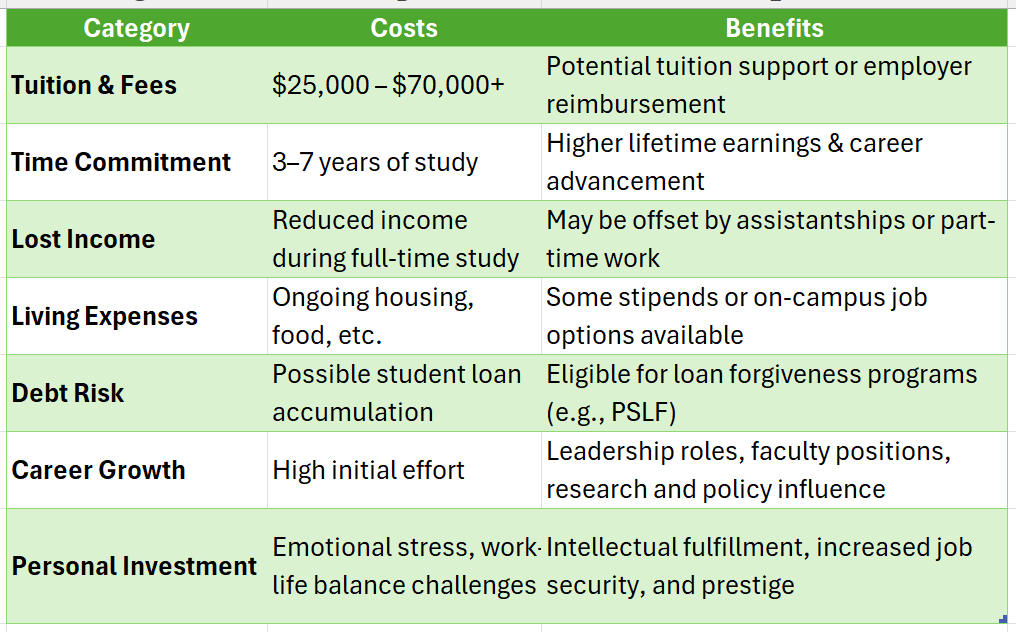
When considering higher education, many ask, “Is a Doctorate in Science Education Worth It?” This question is crucial for aspiring educators and researchers. A doctorate can open doors to advanced teaching positions, research opportunities, and leadership roles in education. But is it the right path for you?
Understanding the Benefits of a Doctorate in Science Education
A doctorate in science education offers several advantages:
- Expertise: You gain deep knowledge in teaching science effectively.
- Career Advancement: It can lead to higher-paying jobs and leadership roles.
- Research Opportunities: You can contribute to important studies that shape education.
Moreover, it can be a stepping stone to other fields, like a doctorate in special education or educational psychology, broadening your career options.
Is It Right for You?
Before diving in, consider your goals. Do you want to teach at a university level? Or perhaps lead educational programs? Reflecting on your aspirations can help you decide if pursuing a doctorate in science education aligns with your future plans.
Study smarter, not harder—Enroll online today!
Is a Doctorate in Science Education Right for You?
Deciding whether a doctorate in science education is worth it can feel like a big puzzle. Many educators wonder if this advanced degree will truly enhance their careers or if it’s just another piece of paper. Understanding the value of a doctorate in science education is crucial, especially if you’re passionate about teaching and research.
Before diving in, consider these key factors:
- Career Goals: Do you want to teach at a university level or lead educational programs? A doctorate in science education can open those doors.
- Passion for Research: If you love exploring new teaching methods or scientific concepts, this degree can fuel that passion.
- Financial Investment: Weigh the costs against potential salary increases. A doctorate in special education or educational psychology might also be worth exploring, depending on your interests.
Ultimately, the decision should align with your personal and professional aspirations. If you’re excited about making a difference in science education, pursuing this doctorate could be a rewarding journey.
Career Opportunities with a Doctorate in Science Education
Considering a doctorate in science education? It’s crucial to explore the career opportunities this advanced degree offers. With a doctorate, you can enhance your career while making significant contributions to education.
Diverse Career Paths
A doctorate in science education opens doors to various roles, including:
- University Professor: Inspire future science educators.
- Curriculum Developer: Create innovative science programs.
- Educational Consultant: Guide schools on effective teaching strategies.
These positions allow you to shape how science is taught and learned.
Related Fields
Additionally, pursuing a doctorate in special education or educational psychology can enhance your expertise. This combination can lead to specialized roles like:
- Specialized Science Educator: Teach science to students with diverse needs.
- Researcher: Investigate best practices in science education and contribute to academic knowledge.
In summary, a doctorate in science education is a valuable investment, providing diverse career opportunities that positively impact the educational landscape.
The Financial Investment: Costs vs. Benefits of a Doctorate

Deciding to pursue a doctorate in science education is a significant choice, especially when considering the financial investment involved. Education can be costly, so it’s vital to evaluate the expenses against the potential benefits. Let’s explore this journey further.
The Cost of a Doctorate
- Tuition Fees: A doctorate in science education ranges from $30,000 to over $100,000, depending on the school.
- Time Investment: Completing the degree typically takes 3-5 years, which may result in lost income if you’re not working full-time.
Potential Benefits
- Higher Salary: Graduates often experience a substantial salary increase. For instance, a doctorate in special education can lead to positions that pay $20,000 more annually than a master’s degree.
- Career Advancement: A doctorate in educational psychology opens doors to leadership roles in schools or universities.
In conclusion, while the costs of a doctorate in science education can be high, the potential benefits, such as increased salary and career opportunities, may make it worthwhile. Consider your career goals and how this degree fits into your future!
How a Doctorate in Science Education Enhances Teaching Skills
When considering whether a doctorate in science education is worth it, one must think about how it can transform teaching skills. This advanced degree not only deepens your knowledge of science but also equips you with innovative teaching strategies that engage students more effectively. Let’s explore how this degree can enhance your teaching abilities.
Improved Understanding of Science Concepts
A doctorate in science education helps teachers grasp complex scientific ideas. With a solid foundation, educators can explain topics clearly, making them more relatable to students. This clarity boosts students’ confidence and interest in science, leading to better learning outcomes.
Innovative Teaching Methods
With a doctorate in special education or educational psychology, teachers learn to adapt their methods for diverse learners. This training encourages creativity in lesson planning, ensuring that every student, regardless of their learning style, can thrive in the classroom. Engaging students through hands-on experiments and interactive discussions becomes second nature.
Exploring Research Opportunities in Science Education
When considering whether a doctorate in science education is worth it, one must think about the exciting research opportunities it can offer. This advanced degree opens doors to explore innovative teaching methods, curriculum development, and even educational technology. But what does that really mean for you?
Research Opportunities in Science Education
With a doctorate in science education, you can dive into various research areas, such as:
- Curriculum Development: Create engaging science programs that inspire students.
- Teaching Methods: Investigate how different strategies impact learning outcomes.
- Educational Technology: Explore how tech can enhance science education.
These topics not only contribute to your field but also help shape future generations of scientists! Additionally, if you’re interested in broader educational fields, you might consider a doctorate in special education or educational psychology. Each of these paths offers unique insights and research opportunities that can complement your focus on science education. Ultimately, the choice depends on your passion and career goals.
The Role of a Doctorate in Science Education in Policy Making
When considering whether a doctorate in science education is worth it, one must think about its impact on policy making. This advanced degree not only deepens your knowledge but also equips you to influence educational policies that shape how science is taught in schools.
A doctorate in science education allows you to become a leader in educational reform. With this degree, you can:
- Advocate for better science curricula
- Collaborate with policymakers to improve teaching standards
- Conduct research that informs educational practices
Moreover, those with a doctorate in special education or educational psychology can also contribute significantly. They bring unique perspectives that help create inclusive policies, ensuring all students have access to quality science education. Ultimately, a doctorate in science education can be a powerful tool for change.
Study smarter, not harder—Enroll online today!
Personal Growth and Development Through Advanced Education
When considering whether a doctorate in science education is worth it, personal growth and development play a crucial role. Pursuing advanced education not only enhances your knowledge but also transforms your approach to teaching and learning. This journey can lead to profound changes in how you view the world and your place in it.
Expanding Your Horizons
A doctorate in science education opens doors to new ideas and perspectives. You’ll dive deep into research, exploring topics that ignite your passion. This exploration can lead to:
- Improved critical thinking skills
- Enhanced problem-solving abilities
- A greater appreciation for scientific inquiry
Building Confidence
As you advance your education, you gain confidence in your expertise. Whether you choose a doctorate in special education or educational psychology, each path equips you with tools to make a difference. This newfound confidence can inspire others, making you a role model in your community.
How Scholarship.Education Can Support Your Journey to a Doctorate
Deciding on a doctorate in science education can be daunting, but the right support makes a difference. With the right resources, you can also explore paths like a doctorate in special education or educational psychology that match your teaching passion.
At Scholarship.Education, we empower future educators through:
- Personalized Guidance: Our advisors help you choose the best doctorate path for your interests.
- Resource Access: Enjoy a wealth of articles, research papers, and tools to enhance your learning.
- Networking Opportunities: Connect with professionals and peers who share your educational goals.
- Flexible Learning Options: Our programs fit your schedule, making it easier to balance work and study.
Starting your doctorate journey is significant, but with Scholarship.Education by your side, you’re supported. Our community and resources make pursuing a doctorate in science education or related fields not only achievable but also enjoyable.
Future Trends in Science Education and the Need for Doctorate Holders
As we consider the future of education, the question arises: Is a Doctorate in Science Education worth it? With teaching methods and technology rapidly evolving, advanced qualifications can significantly enhance your expertise and position you as a leader in the field.
Embracing Technology
- The integration of technology in classrooms is on the rise. A doctorate in science education equips you to effectively lead these changes and design innovative curricula that engage students with digital tools.
Focus on Special Needs
- A doctorate in special education allows you to meet the diverse needs of students in increasingly inclusive classrooms. Additionally, knowledge of educational psychology aids in tailoring teaching methods to support all learners, ensuring everyone succeeds. In conclusion, pursuing a doctorate in science education not only opens doors to exciting opportunities but also meets the growing demand for knowledgeable leaders in the evolving educational landscape.
Study smarter, not harder—Enroll online today!
FAQs
1. What is a Doctorate in Science Education?
It’s a terminal degree focused on research, teaching, and leadership in science education. It prepares graduates for roles in academia, curriculum development, and educational policy.
2. What are the common types of doctoral degrees in science education?
The most common options are the Ph.D. in Science Education (research-focused) and the Ed.D. in Science Education (practice and leadership-focused).
3. Who should consider this degree?
Ideal for science teachers, curriculum specialists, instructional coordinators, or anyone looking to advance in educational leadership or higher education.
4. What are the admission requirements?
Typically, you’ll need a master’s degree, teaching or professional experience in education or science, letters of recommendation, and a statement of purpose.
5. How long does it take to complete?
Most programs take 3 to 5 years, depending on whether you study full-time or part-time.
6. What can I do with a doctorate in science education?
Graduates often become university professors, education researchers, STEM program directors, or policy advisors in education departments or nonprofits.






